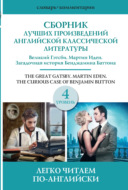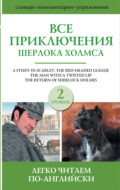Kitabı oku: «Скорбь сатаны / The sorrows of Satan. Уровень 4», sayfa 3
6
I approached and examined the box he held. It was perforated with holes for the admission of air, and within it lay a brilliant coloured winged insect.
“Is it alive?” I asked.
“It is alive, and has some intelligence,” replied Rimanez. “I feed it and it knows me. It is quite tame and friendly as you perceive.”
He opened the case gently. The beetle expanded its radiant wings, and it rose at once to its protector’s hand. He lifted it and held it aloft, then shaking it to and fro lightly, he exclaimed,
“Off, Sprite! Fly, and return to me!”
The creature was looking like a beautiful iridescent jewel. After a few graceful movements hither and thither, it returned to its owner’s hand, and again settled there.
“There is a well-worn saying which declares that ‘in the midst of life we are in death’,” said the prince. “But that maxim is wrong. It should be ‘in the midst of death we are in life.’ This creature is a rare and curious production of death. I found it myself. Listen. I was present at the uncasing of an Egyptian female mummy. She was a princess of a famous royal house. On her chest was a piece of a gold quarter. Underneath this gold plate, her body was swathed round and round. When these were removed it was discovered that the mummified flesh between her breasts had decayed away, and in the hollow or nest, this insect was found alive!”
I could not repress a slight nervous shudder.
“Horrible!” I said. “If I were you, I should kill it, I think.”
He looked at me.
“Why?” he asked. “I’m afraid, my dear Geoffrey, you are not a scientist. To kill the poor creature who managed to find life in the very bosom of death, is a cruel suggestion, is it not? It has eyes, and the senses of taste, smell, touch and hearing. I accept the idea of the transmigration of souls, and so sometimes I think that perhaps the princess of that Royal Egyptian house had a wicked, brilliant, vampire soul, – and that… here it is!”
A cold thrill ran through me from head to foot at these words, and as I looked at the speaker standing opposite me, with the ‘wicked, brilliant, vampire soul’ on his hand. I examined the weird insect more closely. As I did so, its bright beady eyes sparkled, I thought, vindictively, and I stepped back.
“It is certainly remarkable,” I murmured. “No wonder you value it, as a curiosity. Its eyes are quite distinct, almost intelligent.”
“No doubt she had beautiful eyes,” said Rimanez smiling.
“She? Whom do you mean?”
“The princess, of course!” he answered, evidently amused. “The dear dead lady. Some of her personality must be in this creature: it had nothing but her body to nourish itself upon.”
And here he replaced the creature in its crystal habitation.
“I suppose,” I said slowly, “you think that nothing actually perishes completely?”
“Exactly!” returned Rimanez emphatically. “Nothing can be entirely annihilated; not even a thought.”
I was silent.
“And now for luncheon,” he said gaily, passing his arm through mine. “You look twenty per cent. better than when you went out this morning, Geoffrey.”
Seated at table with the dark-faced Amiel in attendance, I related my morning’s adventures. I told him about the publisher who had on the previous day refused my manuscript, and who now, I felt sure, would be glad to accept the offer I had made. Rimanez listened attentively, smiling.
“Of course!” he said, when I had concluded. “I think he showed remarkable discretion and decency. His pleasant hypocrisy shows him to be a person of tact and foresight. Did you ever imagine a human being or a human conscience that could not be bought? The Pope will sell you a specially reserved seat in his heaven if you give him the cash while he is on earth! Nothing is given free in this world. Everything must be bought – with blood, tears and groans occasionally, – but usually with money.”
I fancied that Amiel, behind his master’s chair, smiled darkly at this. I could not formulate to myself any substantial reason for my aversion to this confidential servant. But the aversion increased each time I saw his sullen and sneering features. Yet he was perfectly respectful and deferential; I could find no fault with him
As soon as we were alone, Rimanez lit a cigar.
“Now let us talk,” he said. “I believe I am at present your best friend, and I certainly know the world better than you do. How will you begin spending your money?”
I laughed.
“Well, I shan’t provide funds for the building of a church or a hospital,” I said. “My dear Prince Rimanez, I mean to spend my money on my own pleasure, and I daresay I shall find plenty of ways to do it.”
“With your fortune, you could make hundreds of miserable people happy;” he suggested.
“Thanks, I would rather be happy myself first,” I answered gaily. “I daresay I seem to you selfish. You are philanthropic I know; I am not.”
He still regarded me steadily.
“You might help your fellow-workers in literature…”
I interrupted him with a decided gesture.
“That I will never do, my friend! My fellow-workers in literature have kicked me down at every opportunity. It is my turn at kicking now, and I will show them as little mercy, as little help, as little sympathy as they have shown me!”
“Revenge is sweet!” he said. “Well, in what, at present does your idea of enjoying your heritage consist?”
“In publishing my book,” I answered.
“Tempest,” he said, looking at me through half-closed eyes and a cloud of smoke, “man gives no clue to his intent – more malignant than the lion, more treacherous than the snake, more greedy than the wolf, he takes his fellow-man’s hand in pretended friendship, and with a smiling face he hides a false and selfish heart!”
His eyes glowed with a fiery ardour. I stared at him in mute amazement. There was something terrifying in his attitude. He caught my wondering glance,
“I think I was born to be an actor,” he said carelessly.
“I think,” I answered him, smiling a little, “you are a creature of impulse.”
“How wise of you!” he exclaimed. “Good Geoffrey Tempest, how very wise of you! But you are wrong. If I told you that I am a dangerous companion, that I like evil things better than good, that I am not a safe guide for any man, what would you think?”
“I’d think you were whimsically fond of underestimating your own qualities,” I said. “But I’d like you anyway.”
At these words, he looked at me:
“Tempest, you follow the fashion of the prettiest women. They always like the greatest scoundrels!”
“But you are not a scoundrel,” I rejoined.
“No, I’m not a scoundrel, but there’s a devil in me.”
“All the better!13” I said, stretching myself out in my chair with lazy comfort – “I hope there’s something of him in me too.”
“Do you believe in him?” asked Rimanez smiling.
“The devil? Of course not!”
“He is a very fascinating legendary personage,” continued the prince. “Just imagine his fall from heaven! ‘Lucifer Son of the Morning’ – what a title, and what a birthright! Splendid and supreme, at the right hand of Deity itself he stood, this majestic Archangel. At once he perceived in the vista of embryonic things a new small world, and on it a being forming itself slowly. Then Lucifer, full of wrath, turned on the Master of the Spheres, crying aloud: ‘Will you make of this slight poor creature an Angel even as I? I protest against you and condemn! If you make Man in Our image I will destroy him utterly, as unfit to share with me the splendours of Your Wisdom, the glory of Your love!’ And the Supreme Voice replied; ‘Lucifer, Son of the Morning! Fall, proud Spirit from your high estate! Return no more till Man himself redeem you! When the world rejects you, I will pardon and again receive you, – but not till then.’”
“I never heard that version of the legend before,” I said. “The idea that Man should redeem the devil is quite new to me.”
“Is it?” and he looked at me fixedly. “Poor Lucifer! His punishment is of course eternal, and the distance between himself and Heaven must be rapidly increasing every day, for Man will never assist him to retrieve his error. Man will reject God fast enough and gladly enough – but never the devil. Judge then, how this ‘Lucifer, Son of the Morning,’ Satan, or whatever else he is called, must hate Humanity!”
I smiled.
“Well,” I observed. “He need not tempt anybody.”
“You forget!” said Rimanez. “He swore before God that he would destroy Man utterly. He must therefore fulfill that oath, if he can. Men swear in the name of God every day without the slightest intention of carrying out their promises.”
“But it’s all nonsense,” I said impatiently. “All these old legends are rubbish. You tell the story well, that is because you are eloquent. Nowadays no one believes in either devils or angels. I, for example, do not even believe in the soul.”
“I know you do not,” he answered suavely. “And your scepticism is very comfortable because it relieves you of all personal responsibility. I envy you! For – I regret to say, I am compelled to believe in the soul.”
“Compelled! That is absurd – no one can compel you to accept a mere theory.”
He looked at me with a smile.
“True! Very true! There is no compelling force in the whole Universe. Man is the supreme and independent creature, master of all save his personal desire. True – I forgot! Let us avoid theology, please, and psychology also. Let us talk about the only subject that has any sense or interest in it – money. I perceive your present plans are definite, – you wish to publish a book that will make you famous. Have you no wider ambitions?”
I laughed,
“No. I know there is some intellect in my book, and some originality too. Surely that will lift me up.”
“I doubt it!” he answered. “I very much doubt it. It will be received as a production of a rich man amusing himself with literature. But, as I told you before, genius seldom develops itself under the influence of wealth. You, my dear Tempest, are not a Shakespeare, but your millions will give you a better chance than he ever had in his life, as you will not have to sue for patronage. The exalted personages will be delighted to borrow money of you if you lend it.”
“I shall not lend,” I said.
“Nor give?”
“Nor give.”
“I am very glad,” he observed, “that you are determined not to ‘go about doing good’ as the humbugs say, with your money. You are wise. Spend on yourself! As for me, I always help charities, and put my name on subscription-lists14, and I assist a certain portion of clergy.”
“I rather wonder at that,” I remarked. “Especially as you tell me you are not a Christian.”
“Yes, it seems strange, doesn’t it?” he said with a derision. “But many of the clergy are doing their best to destroy religion, – by cant, by hypocrisy, by sensuality, by shams. When they seek my help in this noble work, I give it, – freely!”
I laughed. At that moment Amiel entered, bearing a telegram for me on a silver salver. I opened it. It was from my friend the publisher, and ran as follows,
“Accept book with pleasure. Send manuscript immediately.”
I showed this to Rimanez with a kind of triumph. He smiled.
“Of course! What else did you expect? It actually means: ‘Accept money for publishing book with pleasure’. Well, what are you going to do?”
“The book must be published as quickly as possible, and I shall personally attend to all the details concerning it. For the rest of my plans…”
“Leave them to me!” said Rimanez.
7
The next three or four weeks flew by in a whirl. By the time they were ended I found it hard to recognize myself in the indolent, listless, extravagant man of fashion I had so suddenly become. The creative faculty was now dormant in me. I did very little, and thought less. But this intellectual apathy was but a passing phase, a mental holiday and desirable cessation from brain-work. My book was nearly through the press. My complacent literary egoism was mixed with a good deal of disagreeable astonishment and incredulity, because my work, written with enthusiasm and feeling, propounded sentiments and theories which I personally did not believe in. Now, how had this happened, I asked myself? How came I to write the book at all? My pen, consciously or unconsciously, had written down things which my reasoning faculties entirely repudiated.
I thought that the book was nobler than its writer. This idea smote me with a sudden pang. I pushed my papers aside, and walking to the window, looked out. It was raining hard, and the streets were black with mud and slush. I was quite alone, for I had my own suite of rooms now in the hotel, not far from those occupied by Prince Rimanez. I also had my own servant, a respectable, good fellow. Then I had my own carriage and horses with coachman and groom. I was in full possession of my fortune, I enjoyed excellent health, and I had everything I wanted. Lucio’s management was very good, and I saw myself mentioned in almost every paper in London and the provinces as the ‘famous millionaire.’ For forty pounds, a well-known ‘agency’ will guarantee the insertion of any paragraph in no less than four hundred newspapers. Money can buy everything.
The persistent paragraphing of my name, together with a description of my personal appearance and my ‘marvellous literary gifts,’ combined with a deferential and almost awestruck allusion to the ‘millions’ which made me so interesting, the paragraph was written out by Lucio, – all this brought upon me two inflictions. First many invitations to social and artistic functions15, and secondly, a stream of begging-letters16. I employed a secretary, who occupied a room near my suite, and who was kept hard at work all day. Needless to say I refused all appeals for money; no one had helped me in my distress, with the exception of my old chum ‘Boffles’.
Yet with all the advantages which I now possessed I could not honestly say I was happy. I knew I could have every possible enjoyment and amusement the world had to offer. I knew I was one of the most envied among men, and yet, I was conscious of a bitterness rather than a sweetness in the full cup of fortune. For example, I had flooded the press with the prominent advertisements of my forthcoming book.
A fog began to darken down over the streets in company with the rain, and disgusted with the weather and with myself, I turned away from the window and settled into an arm-chair by the fire. A tap came at the door, and in answer to my somewhat irritable “Come in!” Rimanez entered.
“What, all in the dark Tempest!” he exclaimed cheerfully. “Why don’t you light up?”
“The fire’s enough,” I answered crossly. “Enough at any rate to think by.”
“And have you been thinking?” he inquired laughing. “Don’t do it. It’s a bad habit. No one thinks nowadays, people can’t stand it17. Their heads are too frail. Just begin to think – and the foundations of society will go down. Besides thinking is always dull work.”
“I have found it so,” I said gloomily. “Lucio, there is something wrong about me somewhere.”
“Wrong? Oh no, surely not! What can there be wrong about you, Tempest? Are you not one of the richest men living?”
“Listen, my friend,” I said earnestly. “You know I have been busy for the last fortnight correcting my book for the press. I have come to the conclusion that the book is not Me. It is not a reflex of my feelings at all. I cannot understand how I wrote it.”
“You find it stupid perhaps?” said Lucio sympathetically.
“No,” I answered with indignation. “I do not find it stupid.”
“Dull then?”
“No, – it is not dull.”
“Melodramatic?”
“No, – not melodramatic.”
“Well, my good fellow, if it is not dull or stupid or melodramatic, what is it!” he exclaimed merrily. “It must be something!”
“Yes, it is this, it is beyond me altogether.” And I spoke with some bitterness. “Quite beyond me. I could not write it now. I wonder I could write it then. Lucio, I daresay I am talking foolishly, but it seems to me I must have been on some higher altitude of thought when I wrote the book. A height from which I have since fallen.”
“I’m sorry to hear this,” he answered, with twinkling eyes. “From what you say it appears to me you have been guilty of literary sublimity. Oh bad, very bad! Nothing can be worse. To write sublimely is a grievous sin, and one which critics never forgive. I’m really grieved for you, my friend.”
I laughed in spite of my depression.
“You are incorrigible, Lucio!” I said. “But your cheerfulness is very inspiriting. All I wanted to explain to you is this, that my book expresses a certain tone of thought which is not me. I, in my present self have no sympathy with it. I must have changed very much since I wrote it.”
“Changed? Why yes, I should think so!” and Lucio laughed heartily. “The possession of five millions changes a man considerably for the better – or worse! But you seem to be worrying yourself about nothing. Not one author in many centuries writes from his own heart or as he truly feels. When he does, he becomes immortal. This planet is too limited to hold more than one Homer, one Plato, one Shakespeare. Don’t distress yourself – you are neither of these three! You belong to the age, Tempest. Observe the signs of the time. Art is subordinate to the love of money – literature, politics and religion the same. You cannot escape from the general disease. The only thing to do is to make the best of it18. No one can reform it.”
He paused. I was silent.
“What I am going to say now,” he proceeded, “will sound ridiculous. In order to write with intense feeling, you must first feel. When you wrote this book of yours, you were almost a human hedgehog in the way of feeling. The ‘change’ you complain of is this: you have nothing to feel about.”
I was irritated.
“Do you take me for a callous creature?” I exclaimed. “You are mistaken in me, Lucio. I feel most keenly…”
“What do you feel?” he inquired, fixing his eyes steadily upon me. “There are hundreds of starving wretches in this metropolis, men and women on the brink of suicide because they have no hope of anything in this world or the next – do you feel for them? Do their grieves affect you? You know they do not, you know you never think of them, why should you? One of the chief advantages of wealth is the ability to shut out other people’s miseries from our personal consideration.”
I said nothing. He was right.
“Yesterday,” he went on in the same quiet voice, “a child was run over here19, just opposite this hotel. It was only a poor child. Its mother ran shrieking out of a back-street, just to see the little bleeding body. She struck wildly with both hands at the men who were trying to lead her away. And then with a cry she fell face forward in the mud – dead. She was only a poor woman. I simply tell you the ‘sad incident’ as it occurred, and I am sure you are not sorry for the fate of either the child or its mother who died in the agony. Now don’t say you are, because I know you’re not!”
“How can one feel sorry for people one does not know or has never seen…” I began.
“Exactly! How is it possible? How can one feel, when one’s self is thoroughly comfortable? Thus, my dear Geoffrey, you must be content to let your book appear as the reflex and record of your past when you were in the sensitive stage. Now you are encased in a pachydermatous covering of gold, which adequately protects you from such influences.”
“You should have been an orator,” I said, rising and pacing the room to and fro in vexation. “But to me your words are not consoling, and I do not think they are true. Fame is easily enough secured.”
“Pardon me,” said Lucio with a deprecatory gesture. “Notoriety is easily secured – very easily. A few critics who have dined with you, will give you notoriety. But fame is the voice of the whole civilized public of the world.”
“The public!” I echoed contemptuously. “The public only care for trash.”
“It is a pity you should appeal to it then,” he responded with a smile. “If you think so little of the public why give it anything of your brain? The public is the author’s best friend and truest critic. But if you prefer to despise, I tell you what to do. Print just twenty copies of your book and present these to the leading reviewers. When they write about you (as they will do – I’ll take care of that) let your publisher advertise ‘First and Second Large Editions’ of the new novel by Geoffrey Tempest, are bought, one hundred thousand copies having been sold in a week!”
I laughed.
“It is a plan of action of many modern publishers,” I said. “But I don’t like it. I’ll win my fame legitimately if I can.”
“You can’t!” declared Lucio with a serene smile. “It’s impossible. You are too rich. That is not legitimate in literature.”
I went over to my table, rolled up my corrected proofs and directed them to the printers.
The door opened and closed – Lucio was gone. I remained alone. We had now been together for nearly a month, and I was no closer to the secret of his actual nature than I had been at first. Yet I admired him more than ever.
Ücretsiz ön izlemeyi tamamladınız.








